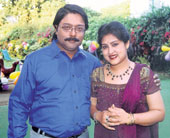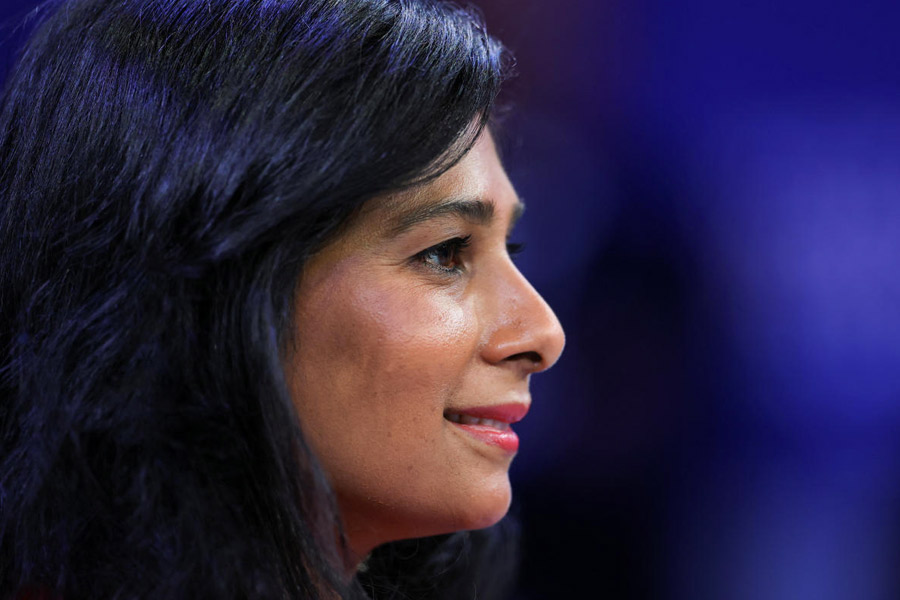 |
How do they do it? Just how have Madhumanti Maitra and Ashoke Viswanathan managed to keep their marriage going for the past 15 years now? Consider this. Her day job is lecturing at a girls’ college. By evening, she’s reeling off the headlines on Doordarshan News. Then, she also sings (Madhumanti has released five solo albums) and anchors a host of television programmes and live events.
Let’s come to husband Ashoke. He’s a respected filmmaker, an award-winning director and is as comfortable in front of the camera as he is behind it ? yes, he’s an actor too. Currently, Ashoke is spending all of his hours in the editing room finishing his latest film, Andhokarer Shabdo. Wrapping up three documentaries is also at the top of his to-do list. But Ashoke’s biggest success thus far has been his very first dalliance with the world of cinema ? an experimental film called Shunyo Theke Shuru. The film did the rounds of many a film festival and came away winning a host of honours including the Indira Gandhi Memorial National Award for the Best First Film of a Director as also the Silver Torch Light at the Pyong Yang International Film Festival in North Korea. Ashoke’s second feature film, Kichu Sanglap Kichu Pralap was also well-received and the film came away with the Special Jury Prize at the 1999 National Awards.
Indeed, the demands of both their varied career choices are incessant. But therein lies the secret, says Madhumanti, who maintains that their crazy schedules have prevented boredom from creeping into their marriage. Seven-year-old Anusha, the couple’s precocious daughter helps too, keeping them constantly on their toes!
MADHUMANTI:
Ashoke and I grew up together and cricket was our favoured game of choice in the neighbourhood ? never mind that I always ended up in the lowly position of fielder. As I entered my teenage years though, I moved in with my grandparents for some time, as my father was transferred out of the city. I guess it was these partings that made me realise just how much I missed Ashoke as a friend.
At first, it was the superficialities that attracted me to Ashoke. He was extremely articulate and quite a hero in the college circuit being on the debate team. I was also drawn to him, as he was different from the others ? he was always interested in things that were far beyond his years.
A significant period in our relationship arose when Ashoke went to Pune to study film-making. Letters soon became our way of staying in sync and the friendship only grew deeper. In a way, Ashoke’s going away did give definition to our relationship.
When he returned, though, I was on the verge of relocating to Santiniketan, as I’d landed a lecturer’s job at Visva-Bharati University. I remember when I first broke the news to him. He wasn’t too happy and I was hurt that he couldn’t bring himself to share my success. It was then that he formally proposed.
The real danger to any marriage, I feel, is the onset of monotony. But thankfully, this hasn’t happened to us, partly because we both have such hectic careers ? more so, Ashoke, for he’s always travelling. And in a way, that’s good as I still miss him when he’s away. Also, there’s nothing that kills a marriage faster than domestic friction. Again, we’ve been lucky on this front, as I have great in-laws and good servants who take care of all the household nitty-gritty. Another thing that I’m really grateful for is that Ashoke gives me a lot of space. Moreover, he is very patient and has the ability to stay cool at all times ? quite unlike me.
Now for the negatives! First up is his snoring and his constant reassurances that he’ll visit an ENT. My second bone of contention is that he doesn’t lead a disciplined lifestyle. Also, Ashoke can hardly be called a romantic. He’s just not a person who will make a big production of things. I vividly recall our honeymoon in Kodaikanal. There we were, in this idyllic place, but as soon as we checked into our room, all Ashoke could do was switch on the television and tune in to the news. That said, however, I must admit that I’m all right with his performance ? or lack of it ? in the romance department. After all, it could get terribly cloying!
What I admire about Ashoke but at the same time find disturbing, is that he is quite stubborn when it comes to the type of films he makes. He will only do a certain kind of film and refuses to cater to commercialism. Professionally, he’s an extremely sensitive director and a wonderful perfectionist. The problem is that cinema is not only about art, it’s also about commerce and this is, I feel, a stumbling block for him.
ASHOKE:
I must have been a mere five or six when I first met Madhumanti. We grew up in the same neighbourhood and it wasn’t long before we became friends. At first she was just another girl who used to play with us. It was only much later in the late 1980’s that we grew close. I remember asking her to marry me in 1988 ? no, it wasn’t a much-planned affair ? I simply popped the question.
What I love about my wife is that she’s extremely organised ? both in her career and her personal life. So I’ve learnt ? and still am ? quite a few lessons from her in this particular department. She is also a devoted animal-lover and dutifully takes care of all the strays in the neighbourhood. Of course, I wish both of us could be as organised and successful when it comes to taking care of our daughter, Anusha ? who, to put it simply, is one tough cookie!
When it comes to some of Madhumanti’s most annoying habits, though, it’s difficult to say because her one flaw is also a worthy cause for admiration. You see, Madhumanti can be very obdurate in her principles and while at times, it’s annoying, I can’t help but admire her for it.
From a professional point of view, I believe Madhumanti is very competent. But I do feel that she deserves much more success. After all, she’s a gifted singer and writer.










